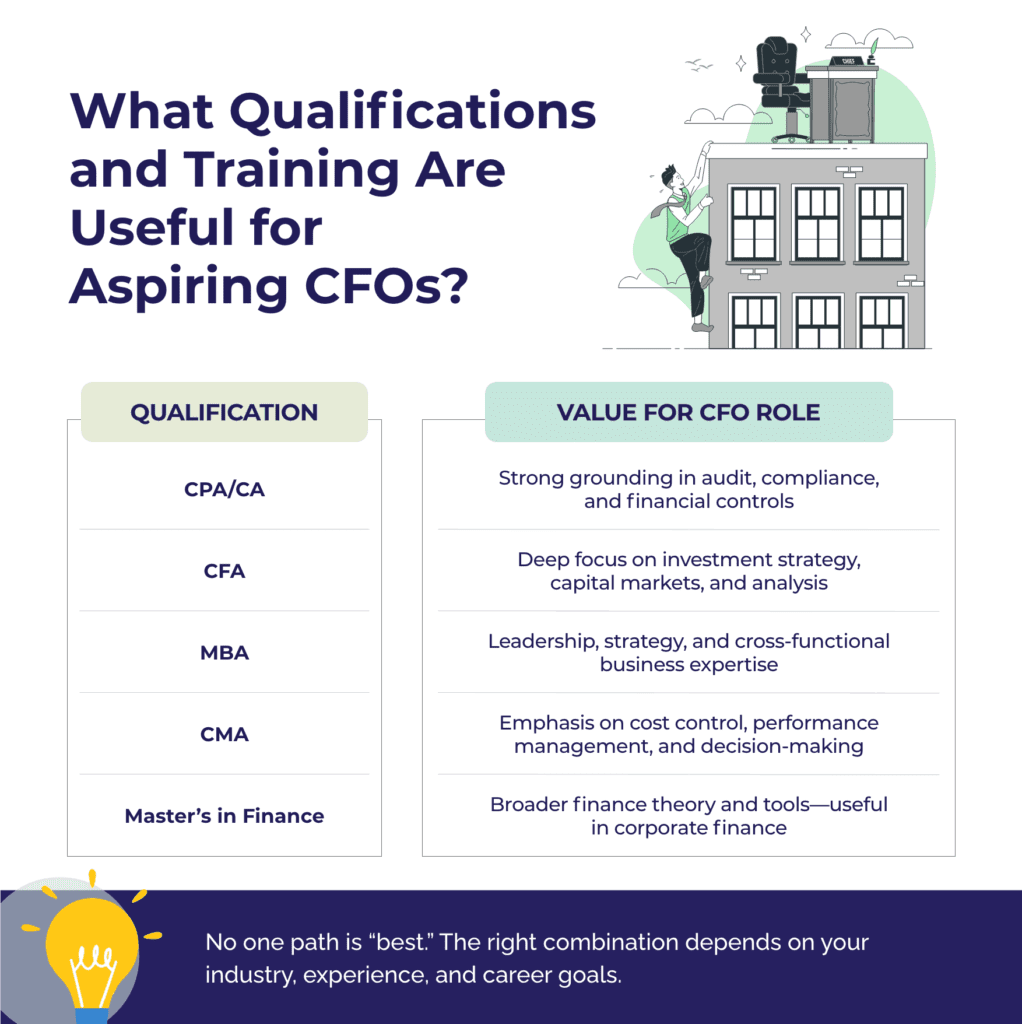Do You Need to Be a Qualified Accountant to Be a CFO?

Is it necessary to hold an accounting qualification to meet CFO job requirements?
You do not need to be a qualified accountant to become a CFO, but having financial expertise is essential. While CFO required qualifications often include certifications like CPA or CFA, many successful CFOs come from broader business, strategy, or operations backgrounds. Today’s CFO job requirements prioritize leadership, strategic thinking, and cross-functional influence—skills that can be gained through diverse pathways beyond pure accounting.
Are CFO Qualifications Limited to Accounting Backgrounds?
While many CFOs historically rose through the ranks of accounting, the modern CFO is a far more versatile role. According to research from Spendesk and the Wall Street Journal, companies are increasingly appointing CFOs without formal accounting qualifications.
That said, CFO qualifications often still include certifications like:
- CPA (Certified Public Accountant)
- CA (Chartered Accountant)
- CFA (Chartered Financial Analyst)
- CMA (Certified Management Accountant)
These credentials demonstrate a strong grasp of financial principles and are especially useful if your organization is highly regulated or board-governed. However, they are not the only route to CFO success.
What Do Today’s CFO Job Requirements Actually Look Like?
The CFO job requirements in today’s business landscape go far beyond technical finance. CFOs are now expected to:
- Shape corporate strategy
- Partner with the CEO and board
- Manage investor relations
- Lead M&A activity and capital planning
- Drive digital transformation
- Guide enterprise-wide performance
These demands require more than just accounting know-how—they require business acumen, leadership, and communication skills.
According to recent surveys of Fortune 500 and S&P 500 companies:
- 50% of CFOs hold an MBA
- 33.6% are CPAs
- 10.4% hold both an MBA and a CPA
This data reinforces that a mix of business and finance training is increasingly common—and valued.
Can You Be a CFO Without an Accounting Qualification?
Yes—and many CFOs prove it every day. However, you must have a solid appreciation for accounting fundamentals, especially if you are responsible for financial disclosures, audits, and compliance.
As Kirkland Andrews, CFO of NRG Energy, put it:
“You need an appreciation of accounting. You want to be closely aware of all of the new provisions.”
Even without formal certification, aspiring CFOs can succeed by:
- Gaining on-the-job exposure to accounting and financial reporting
- Working closely with controllers and finance teams
- Staying updated on regulatory and accounting rule changes
- Enrolling in targeted training to fill technical gaps
It’s not about having every credential—it’s about building the right capabilities.
What Qualifications and Training Are Useful for Aspiring CFOs?
Here’s a breakdown of the most relevant CFO qualifications and their typical benefits:

What If You’re Not a Qualified Accountant?
If you’re aiming for a CFO role without accounting credentials, focus on skill-building and strategic positioning. You should:
- Deepen your understanding of financial reporting and audit cycles
- Develop strong relationships with finance and compliance leaders
- Invest in CFO-specific training to fill leadership and technical gaps
- Gain experience in budgeting, forecasting, and capital planning
- Build credibility by delivering results and influencing cross-functional decisions
One of the best ways to round out your profile is by joining a CFO development program designed for non-traditional candidates.
Want to Learn the Skills That Matter for Today’s CFOs?
Whether or not you’re a qualified accountant, GrowCFO’s Future CFO Program is designed to prepare you for the top finance role. You’ll gain critical tools in strategy, leadership, boardroom communication, and performance management—regardless of your certification status.
While traditional accounting qualifications are valuable, they are not mandatory for becoming a successful CFO. The modern CFO job requirements demand a broader skill set—one rooted in leadership, commercial insight, and strategic thinking. Focus on developing those, and the role is well within your reach.
Reserve your place at our next Preview Event.





Responses